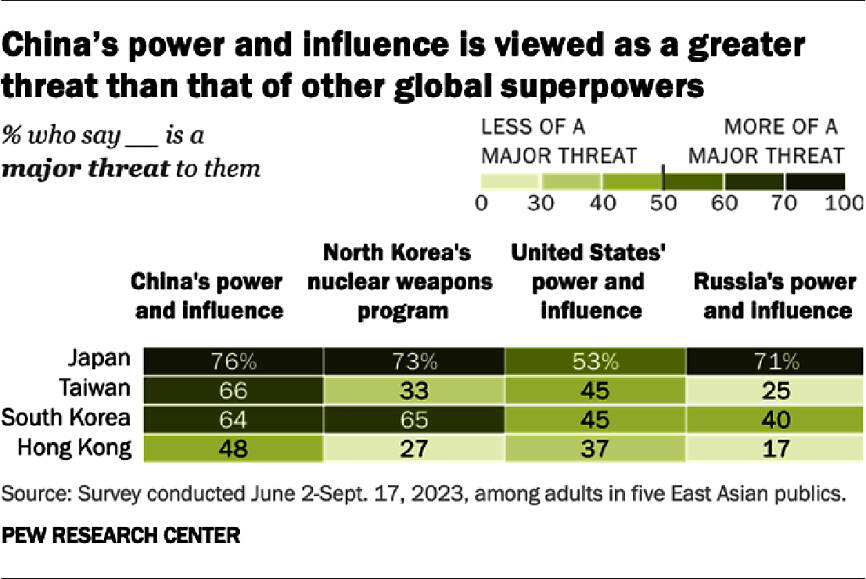Japanese are more likely to view China as a major threat than Taiwanese, although both sides agree that Beijing’s power and influence are the most concerning geopolitical hazard, a Pew Research Center poll showed on Tuesday.
From June 2 to Sept. 17, Pew researchers polled respondents in Taiwan, Japan, South Korea and Hong Kong on perceived threats posed by China, the US, Russia and North Korea.
China’s power and influence was considered the greatest threat above North Korea’s nuclear weapons program, or US or Russian influence, the report said.

Japanese respondents showed the most concern over China, with 76 percent calling it a “major threat” compared with 66 percent in Taiwan and 64 percent in South Korea, it said.
In Hong Kong the rate was 48 percent, with 29 percent not considering Chinese influence a threat, it said.
This year’s figure among Japanese is comparable to the 74 percent recorded during tensions in waters west of Japan in 2013, Pew said, but added that respondents in South Korea were less skeptical of China than they were a decade ago, when 76 percent said its influence posed a major threat.
Views of China’s threat level in Taiwan correlated with age and party affiliation, researchers said.
People younger than 35 in Taiwan and Hong Kong were more likely to say China as a major threat, the report said.
Supporters of the Democratic Progressive Party (DPP) were also more likely to think so at 78 percent than Chinese Nationalist Party (KMT) supporters at 59 percent, it said.
Japanese and South Korea respondents named North Korea’s nuclear weapons program as a major threat at rates of 73 and 65 percent respectively, while the figure was only 33 percent in Taiwan, it added.
In Japan, 71 percent of respondents named Russian influence as a major threat, while the figure was under half in the other regions, it said.
Only Japan had a majority who considered US power and influence to be a major threat at 53 percent, compared with 45 percent in Taiwan and South Korea, and 37 percent in Hong Kong, although 40 percent of Hong Kong respondents considered it a “minor threat,” the poll showed.
KMT supporters were more likely to view the US as a major threat at 63 percent, compared with 34 percent of DPP supporters, the report said.

MAKING WAVES: China’s maritime militia could become a nontraditional threat in war, clogging up shipping lanes to prevent US or Japanese intervention, a report said About 1,900 Chinese ships flying flags of convenience and fishing vessels that participated in China’s military exercises around Taiwan last month and in January have been listed for monitoring, Coast Guard Administration (CGA) Deputy Director-General Hsieh Ching-chin (謝慶欽) said yesterday. Following amendments to the Commercial Port Act (商港法) and the Law of Ships (船舶法) last month, the CGA can designate possible berthing areas or deny ports of call for vessels suspected of loitering around areas where undersea cables can be accessed, Oceans Affairs Council Minister Kuan Bi-ling (管碧玲) said. The list of suspected ships, originally 300, had risen to about 1,900 as

Japan’s strategic alliance with the US would collapse if Tokyo were to turn away from a conflict in Taiwan, Japanese Prime Minister Sanae Takaichi said yesterday, but distanced herself from previous comments that suggested a possible military response in such an event. Takaichi expressed her latest views on a nationally broadcast TV program late on Monday, where an opposition party leader criticized her for igniting tensions with China with the earlier remarks. Ties between Japan and China have sunk to the worst level in years after Takaichi said in November that a hypothetical Chinese attack on Taiwan could bring about a Japanese

MORE RESPONSIBILITY: Draftees would be expected to fight alongside professional soldiers, likely requiring the transformation of some training brigades into combat units The armed forces are to start incorporating new conscripts into combined arms brigades this year to enhance combat readiness, the Executive Yuan’s latest policy report said. The new policy would affect Taiwanese men entering the military for their compulsory service, which was extended to one year under reforms by then-president Tsai Ing-wen (蔡英文) in 2022. The conscripts would be trained to operate machine guns, uncrewed aerial vehicles, anti-tank guided missile launchers and Stinger air defense systems, the report said, adding that the basic training would be lengthened to eight weeks. After basic training, conscripts would be sorted into infantry battalions that would take

DEEP-STRIKE CAPABILITY: The scenario simulated a PLA drill that turned into an assault on Taiwan’s critical infrastructure, with the launchers providing fire support Taiwan yesterday conducted this year’s first military exercises at Longsiang Base in Taichung, demonstrating the newly acquired High Mobility Artillery Rocket System’s (HIMARS) ability to provide fire support and deep-strike capabilities. The scenario simulated an attack on Penghu County, with HIMARS trucks immediately rolling into designated launch areas and firing barrages at the Wangan (望安) and Cimei (七美) islands, simulating the provision of fire support against invading forces. The HIMARS are supposed to “fire and leave,” which would significantly increase personnel and equipment survivability, a military official said. The drill simulated an exercise launched by the Chinese People’s Liberation Army (PLA) Eastern